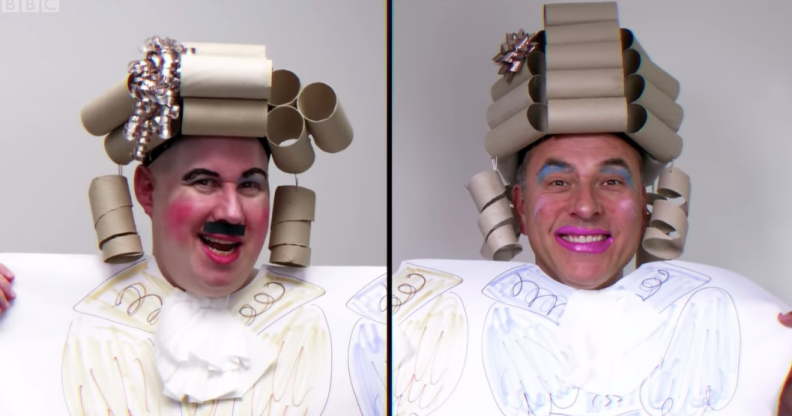Little Britain revives painfully outdated ‘I’m a lady’ sketch, despite Matt Lucas claiming he regrets ‘cruel’ anti-trans jokes

Matt Lucas and David Walliams recreating one of their most offensive Little Britain sketches (YouTube/BBC)
The comedy sketch show Little Britain returned to our screens last night, bringing with it a cruel, anti-trans joke that should have been left in the past.
Matt Lucas and David Walliams took part in the BBC’s Big Night In, a three-hour charity marathon by Children in Need and Comic Relief to raise money for the coronavirus pandemic.
Despite Lucas’ previous claims that he regrets the show’s “mean” approach to minority groups, the comedy duo predictably fell back on their old brand of crass and antiquated humour.
With costumes created from items around their homes, Lucas and Walliams revived their classic characters – Lou and Andy, Marjorie Dawes, Dafydd Thomas, Vicky Pollard, and, unfortunately, the two ‘unconvincing transvestites’ Emily and Florence.
First broadcast 17 years ago, the brazenly transphobic ‘I’m a lady’ sketch is one of the most offensive gags in the Little Britain repertoire. At the crux of the joke is Walliams’ portrayal of Emily Howard, a transvestite who desperately attempts – and fails – to pass as a high-society lady.
“We made a more cruel kind of comedy than I’d do now. Society has moved on a lot since then, and my own views have evolved,” Lucas said in a 2017 interview with The Big Issue.
He also said that if he could go back and do the show again, he wouldn’t have made the transvestite joke.
“She was fun at the time but I think we look differently at the transgender community now and it would be very hard to do that,” he said.
Unfortunately all his good intentions went out the window as he and Walliams returned to their old roles for the BBC special, pasting crude makeup on their faces and donning ringleted wigs made from toilet paper tubes.
“I’m a lady!” Walliams says, repeating the catchphrase. “I’m also a lady, but I don’t think we should do be doing this sketch anymore,” Lucas adds, before moving on very quickly.
The offensive joke was only given a few seconds of screen time amongst all of the other Little Britain characters – which begs the question of why it was included at all.
There is an argument that ‘lampshading’ an issue takes the sting out of the joke by acknowledging the offensive element, explaining it, and allowing the audience to move on.
A good example of this in action is Simon Pegg’s explanation of a homophobic reference in the 2004 zombie apocalypse film, Shaun of the Dead.
Pegg and his co-star Nick Frost recently revisited the joke in a video tackling the coronavirus outbreak. At the moment in the original film where Frost scoffs “Alright, gay!” the line has been pointedly changed to “Alright, grey!”
At this point Pegg breaks out of character to explain that the original Shaun of the Dead line wasn’t intended to be homophobic, but was actually a subtle criticism of homophobia.
“I know it’s 2020 but the original joke wasn’t intended as homophobic, it was more of a comment on the absurdity of straight male appropriation of homophobic signifiers in order to denote their aversion to emotional candidness,” he says.
However, that’s not what we’re seeing here from the Little Britain sketch. There is no explanation or apology for the joke’s transphobic overtones, only an acknowledgement that it’s no longer appropriate for broadcast… while it’s being broadcast to millions.
Simply moving past it while saying “I don’t think we should be doing this anymore” is not enough to redeem the fact that the joke was included at all, because its creators take no responsibility for making it in the first place, or for remaking it again nearly 15 years later.
Instead of subverting the joke as Pegg did, they played it straight, seemingly passing the onus of responsibility onto the transgender community and allies for no longer allowing their transphobic humour.
Walliams clearly saw fit not to don blackface and revive the character Desiree DeVere, obviously understanding that a walking symbol of discrimination is not something to be laughed about.
Why he and Lucas were unable to extend this towards gender identity – a protected characteristic under the Equality Act 2010, just like race – is unclear.

